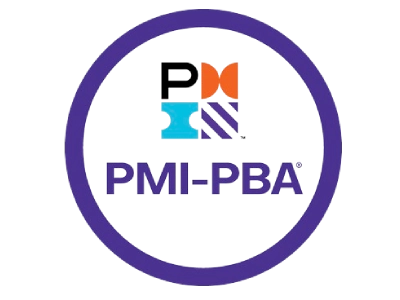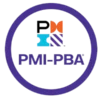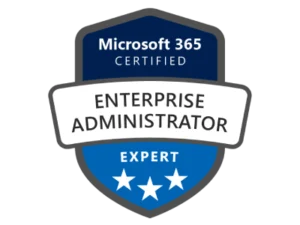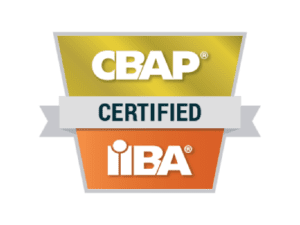PMI-PBA® Certification
The PMI Professional in Business Analysis (PMI-PBA)® course is a thorough curriculum created for anyone who want to become certified globally and improve their business analysis abilities. A variety of crucial subjects are covered in this course, beginning with an introduction to business analysis that defines the field, who does it, and why requirements are important.
Overview
A comprehensive understanding and mastery of business analysis ideas, tasks, and procedures is required for holders of the internationally renowned PMI Professional in Business Analysis (PMI-PBA) credential. Earners can evaluate the needs of the company in order to assist in creating a workable solution for a challenge or opportunity. Those who obtain this certification collaborate with stakeholders to establish specifications, mold project deliverables, and propel desired business results.
Who Should Attend PMI-PBA® Certification Course?
- Business Analysts
- Business Systems Analysts
- Business customers, users or partners
- New Product Development PMs
- Project Coordinators
- Project Managers and Team Leaders
- Systems Architects and Developers
- IT Managers/Directors
- Software Developers
- Systems Testers and Analysts
- QA Professionals
What you will Learn in PMI Professional in Business Analysis (PMI-PBA)®?
This PMI-PBA® course, which focuses on requirements management and business solution evaluation, gives participants the information and abilities needed for effective business analysis.
Our Package
1. What is Business Analysis?
2. Who Performs Business Analysis?
a) Skillset and Expertise Needed for the Business Analysis Role
b) How Organizations Implement Business Analysis
c) The Relationship Between the Project Manager, Business Analyst, and Other Roles
d) The Need to Build the Relationships
3. Definition of Requirement
a) Who has the Responsibility for the Requirements?
b) Requirement Types
1. Overview of this Section
2. Why Perform Needs Assessments
3. Identify Problem or Opportunity
a) Identify Stakeholders
b) Investigate the Problem or Opportunity
c) Gather Relevant Data to Evaluate the Situation
d) Draft the Situation Statement
e) Obtain Stakeholder Approval for the Situation Statement
4. Assess Current State of the Organization
a) Assess Organizational Goals and Objectives
b) Perform Root Cause Analysis on the Situation
c) Determine Required Capabilities Needed to Address the Situation
5. Recommend Action to Address Business Needs
a) Include a High-Level Approach for Adding Capabilities
b) Provide Alternative Options for Satisfying the Business Need
c) Identify Constraints, Assumptions, and Risks for Each Option
d) Assess Feasibility and Organizational Impacts of Each Option
e) Recommend the Most Viable Option
f) Conduct Cost-Benefit Analysis for Recommended Option
6. Assemble the Business Case
1. Overview of this Section
2. The Importance of Business Analysis Planning
3. Conduct or Refine the Stakeholder Analysis
4. Create the Business Analysis Plan
5. Plan the Business Analysis Work
a) Determine Who Plans the Business Analysis Effort
b) Build the Business Analysis Work Plan
c) Assemble the Business Analysis Work Plan
d) Document the Rationale for the Business Analysis Approach
e) Review the Business Analysis Plan with Key Stakeholders
f) Obtain Approval of the Business Analysis Plan
1. Purpose of this Section
2. What it means to Elicit Information
a) Elicitation Is More than Requirements Collection or Gathering
b) Importance of Eliciting Information
3. Plan for Elicitation
a) Develop the Elicitation Plan
b) Finding Information
c) Techniques for Eliciting Information
d) Sequencing the Elicitation Activities
4. Prepare for Elicitation
a) Conduct Elicitation Activities
b) Document Outputs from Elicitation Activities
c) Complete Elicitation
d) Elicitation Issues and Challenges
e) Analyze Requirements
f) Model and Refine Requirements
g) Document the Solution Requirements
h) Validate Requirements
i) Verify Requirements
j) Approval Sessions
k) Resolve Requirements-Related Conflicts
1. Overview of this Section
2. Traceability
3. Relationships and Dependencies
4. Approving Requirements
5. Base lining Approved Requirements
6. Monitoring Requirements Using a Traceability Matrix
7. The Requirements Life Cycle
8. Managing Changes to Requirements
1. Overview of this Section
2. Purpose of Solution Evaluation
3. Recommended Mindset for Evaluation
4. Plan for Evaluation of the Solution
5. Determine What to Evaluate
6. When and How to Validate Solution Results
7. Evaluate Acceptance Criteria and Address Defects
8. Facilitate the Go/No-Go Decision
9. Obtain Signoff of the Solution
10. Evaluate the Long-Term Performance of the Solution
11. Solution Replacement/Phase out
Upcoming Batch
April 20th (Weekends)
FRI & SAT (4 Weeks)
08:30 PM to 01:00 AM (CDT)
April 18th (Weekdays)
MON – FRI (18 Days)
10:00 AM to 12:00 PM (CDT)
PMI-PBA® Certification FAQs
- Secondary degree (high school diploma, associate degree or
- 7,500 hours of business analysis experience
- 2,000 hours working on project teams*
- 35 contact hours of education in business analysis
OR
- Bachelor’s degree or the global equivalent
- 4,500 hours of business analysis experience
- 2,000 hours working on project teams*
- 35 contact hours of education in business analysis
- Skills and clarity needed to effectively perform a business analyst’s role
- Core terminology, principles, and practices of Business analysis
- Achieving reliable, quality results with enhanced efficiency and consistency






Reviews
There are no reviews yet.